Understanding the Value of Routine Dental Checkups
Maintaining a healthy smile goes beyond daily brushing and flossing. Routine dental checkups serve as a critical pillar in preserving oral health, detecting problems early, and preventing complex dental issues. This article explores why regular visits to your dentist are essential, what these visits entail, and how they contribute to your overall well-being.
The Importance of Routine Dental Checkups for Oral Health
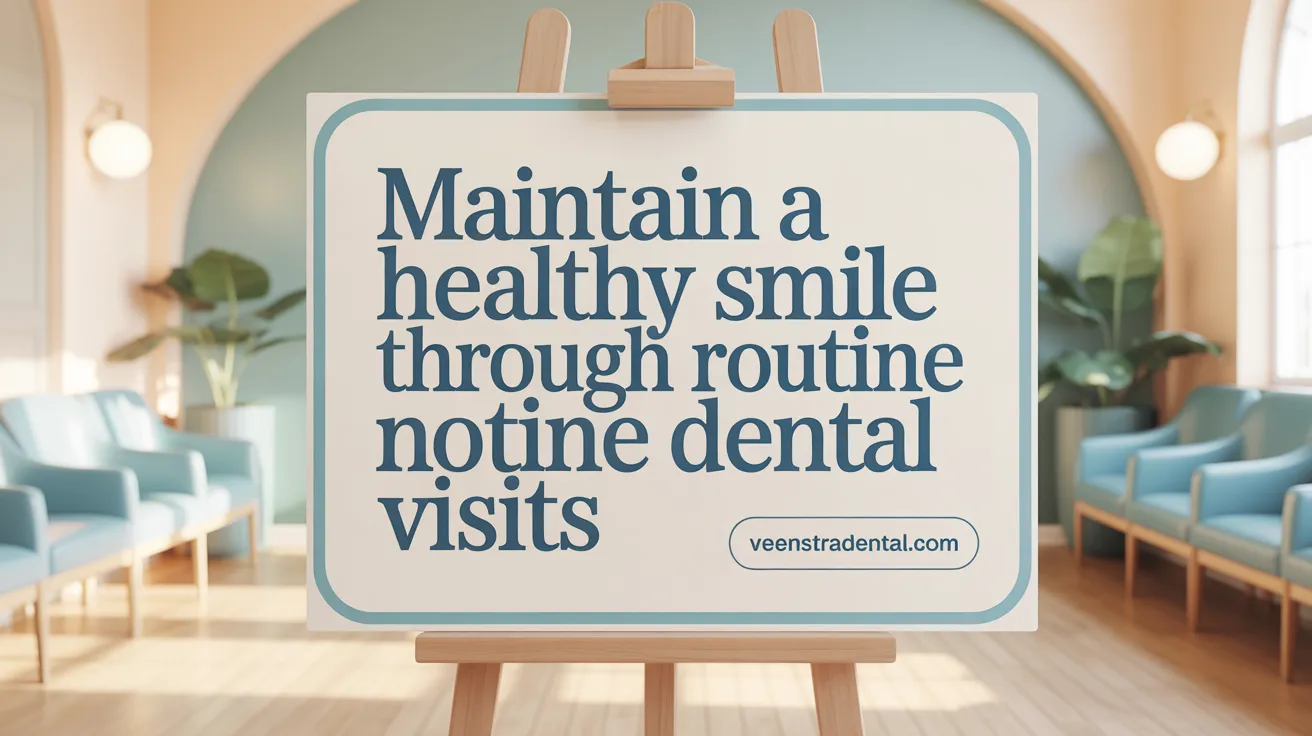
Why are routine dental checkups important for maintaining oral health?
Routine dental checkups are vital for keeping your mouth healthy and spotting problems early before they become serious. During these visits, dentists evaluate your teeth, gums, and oral tissues, looking for early signs of cavities, gum disease, or oral cancer.
Professional cleanings help remove plaque and tartar build-up that regular brushing and flossing might miss. This prevents tooth decay and gum problems, keeping your mouth healthier.
Checkups often include X-rays, which can reveal hidden issues such as cavities between teeth or bone loss. Early detection allows for treatment that is less invasive, less costly, and more effective.
In addition to cleaning and detection, your dentist provides personalized advice on brushing, flossing, and diet. Regular visits help build a trusting relationship, making it easier to address your concerns.
Evidence shows that people who go for routine exams report fewer dental issues over time. They also tend to have healthier gums and teeth, especially as they age.
Moreover, maintaining good oral health through consistent checkups is linked to overall well-being. Poor oral health has been associated with systemic conditions like heart disease, stroke, and diabetes.
Whether you are young or old, regular dental checkups are a proven way to prevent many common dental problems and support your long-term health.
Preventative Benefits and Procedures of Routine Dental Exams
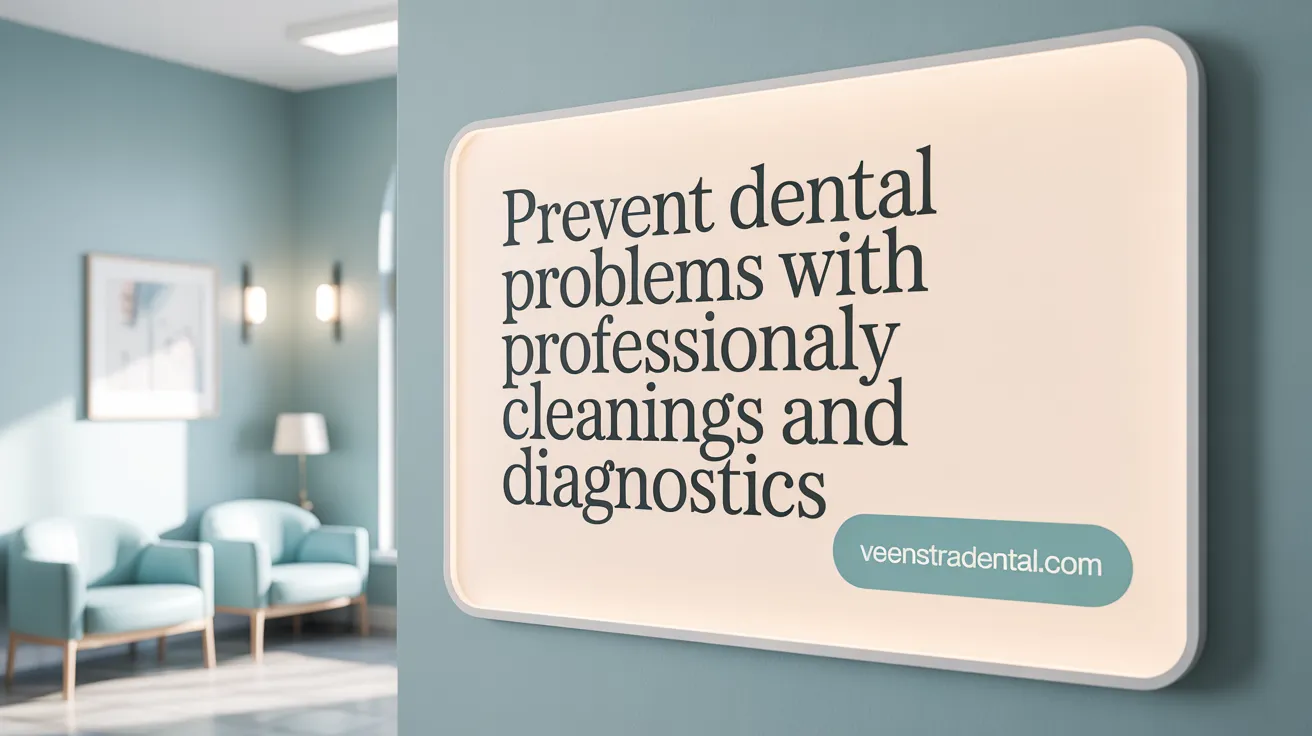
What are the preventative benefits of regular dental visits?
Regular dental visits are essential for maintaining good oral health and preventing complex dental issues later on. These checkups enable early detection of problems such as cavities, gum disease, and oral cancer, allowing for prompt treatment that is often less invasive and less costly. Dental professionals perform comprehensive cleanings to remove plaque and tartar that regular brushing and flossing might miss, reducing the risk of decay and periodontal disease.
Advanced diagnostic tools, including X-rays and intraoral cameras, help identify hidden issues early, facilitating timely intervention. These preventive measures not only protect oral health but also support overall health, as poor oral health is linked to systemic conditions like heart disease, diabetes, and strokes.
Scheduling regular visits also helps save money in the long run by avoiding expensive procedures that result from untreated dental problems. Overall, routine checkups promote better health, boost confidence through healthier smiles, and enhance quality of life.
What procedures are typically involved in a routine dental checkup?
A standard dental checkup usually starts with a patient history update, including any concerns or symptoms. The dentist conducts a detailed examination of the mouth, inspecting teeth, gums, soft tissues, and the neck for abnormalities or signs of disease.
X-rays are often taken to detect issues not visible during a visual exam, such as cavities between teeth or bone loss. A dental hygienist then performs a professional cleaning, which includes scaling to remove plaque and tartar buildup, polishing the teeth to eliminate surface stains, and applying fluoride treatments to strengthen enamel.
During the visit, the dentist also screens for oral cancer by examining soft tissues, checking for unusual lesions or growths. They discuss oral hygiene habits with the patient, offering personalized advice on brushing, flossing, and dietary choices.
The appointment concludes with the dentist discussing findings, addressing questions, and scheduling future visits if necessary. These comprehensive procedures aim to prevent the development of more serious dental issues and foster ongoing oral health.
Recommended Frequency and Individualized Scheduling of Dental Exams
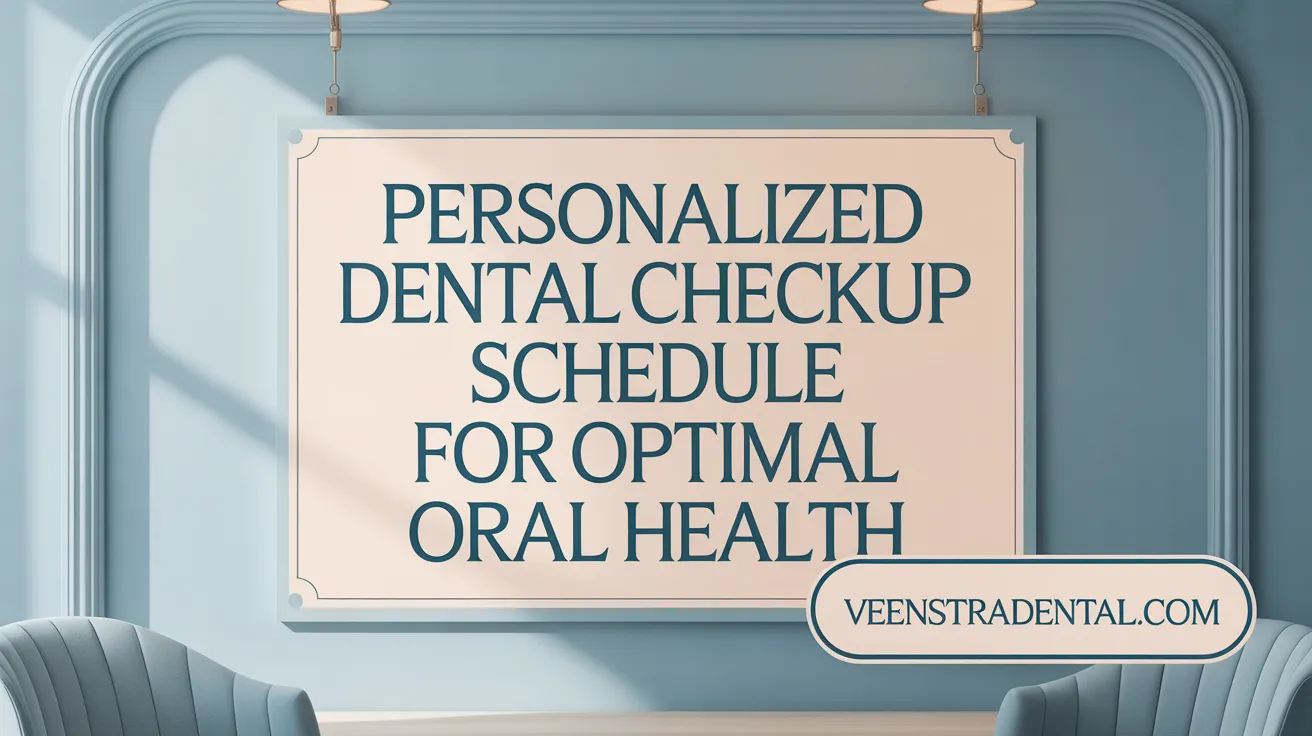
How often should routine dental exams be scheduled?
Most adults should visit the dentist approximately every six months. Regular checkups at this interval help catch early signs of cavities, gum disease, and even oral cancer, allowing for timely and effective treatment.
However, the ideal frequency can vary significantly based on individual risk factors. People with higher susceptibility to dental issues, such as smokers, diabetics, and those with a history of dental problems, may need more frequent visits, sometimes every two to three months. Conversely, individuals with excellent oral health and low risk for dental problems might extend their checkups up to 18-24 months, although at least once a year is generally recommended.
Variations based on individual risk factors
Certain health conditions and lifestyle choices influence how often you should have dental exams. For example, pregnant women, people with compromised immune systems, and those undergoing orthodontic treatment often require more frequent visits. Patients with a history of gum disease might need periodontal maintenance every three to four months.
Dental professionals evaluate personal risk based on factors such as oral hygiene habits, medical history, and previous dental assessments. These assessments help in customizing a dental care schedule that is most effective for each individual.
Importance of personalized dental care
A personalized approach ensures that each person receives the appropriate level of care to maintain oral health. Regular visits tailored to individual needs improve disease prevention, early detection of issues, and overall oral health outcomes.
Following your dentist’s advice on visit frequency, based on your specific situation, optimizes your oral health and can prevent more significant, costly problems in the future.
| Frequency Recommendations | Risk Level | Typical Patients | Additional Notes |
|---|---|---|---|
| Every 6 months | Average risk | Most adults | Standard preventive checkups |
| Every 2-3 months | High risk | Smokers, diabetics, those with gum disease | More frequent monitoring |
| Annually or longer | Low risk | Individuals with excellent oral hygiene, little medical history | Extended intervals possible, but at least once a year recommended |
| More frequent (every 3-4 months) | Specific conditions | Patients with periodontal disease or undergoing treatment | Focused maintenance and prevention |
Regular dental exams, tailored to your individual needs, are fundamental for maintaining oral health and overall well-being.
Early Detection and Prevention of Dental Issues Through Checkups
How do dental checkups contribute to early detection and prevention of dental issues?
Routine dental examinations are crucial for spotting problems like cavities, gum disease, and oral cancer early, before symptoms become severe. During these visits, dentists carefully examine the mouth, teeth, and gums using both visual inspections and advanced diagnostic tools. These tools include X-rays, which reveal hidden issues such as decay below the surface or early-stage bone loss.
Professional cleanings are also a vital part of checkups. They remove plaque and tartar that regular brushing and flossing might miss, helping prevent decay and periodontal disease. Dentists may also apply fluoride treatments or sealants during visits to strengthen teeth and protect against future cavities.
Dentists offer personalized advice on oral hygiene, aiming to improve daily habits and prevent common dental problems. Regular checkups thus serve as a proactive approach, catching issues early and making treatment simpler, less invasive, and less costly.
Use of diagnostic technologies
The use of diagnostic tools enhances early detection. X-rays can reveal cavities, impacted teeth, or bone loss that isn't visible during a visual exam. Some practices also use laser or digital imaging technologies for more precise, quick assessments.
Preventative treatments offered during visits
Preventive measures are often incorporated during routine exams. These include:
- Fluoride applications to deposit minerals and strengthen enamel.
- Sealants that coat the deep grooves of molars, preventing bacteria from causing decay.
- Education on effective brushing and flossing techniques.
- Dietary advice to reduce sugar intake.
These interventions help maintain oral health and reduce the risk of developing serious dental conditions. Overall, consistent dental visits equipped with advanced diagnostics and preventive treatments form a solid foundation for long-term oral health.
Long-Term Health Benefits and Overall Well-Being Linked to Dental Care
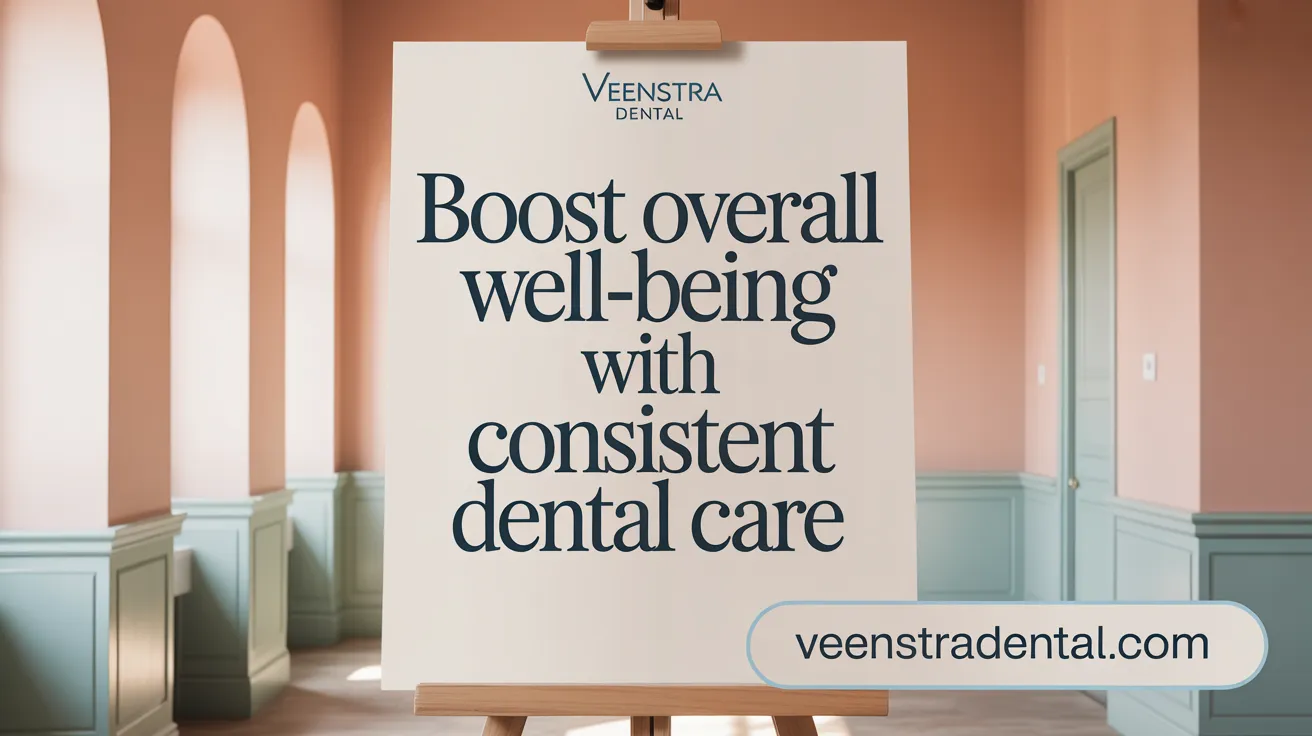
What are the long-term health advantages of regular dental care?
Regular dental care plays a vital role in preserving overall health over the years. By maintaining healthy teeth and gums through consistent checkups and professional cleanings, individuals significantly reduce the risk of developing severe dental issues such as tooth loss, cavities, and gum disease. Early detection of problems during routine visits allows for prompt treatment, preventing minor issues from escalating into painful or costly conditions.
Moreover, there is a proven connection between oral health and systemic health. Conditions like periodontal disease and oral infections have been linked to serious health problems including heart disease, diabetes, and respiratory infections. Routine dental visits also facilitate the early discovery of oral and head and neck cancers, increasing the chances of successful treatment.
In essence, sustained oral hygiene combined with professional care supports both the longevity of natural teeth and overall health, offering benefits that extend well beyond the mouth.
Why are routine dental exams necessary for overall health and well-being?
Routine dental exams are essential components of holistic health care. They enable early detection of dental issues such as cavities, gum disease, and oral cancer, often before symptoms manifest, allowing for less invasive and more effective interventions.
Maintaining good dental health prevents pain, eating difficulties, and nutritional deficiencies, especially in older adults. Additionally, research shows a strong link between oral health and systemic diseases like heart disease, diabetes, and respiratory illnesses. Dental professionals also provide tailored advice on oral care habits, which supports lifelong health.
Regular checkups contribute directly to wellbeing by preventing dental emergencies, reducing healthcare costs, and improving quality of life. They offer a proactive approach that safeguards both mouth and body, ensuring early management of potential health issues and fostering overall vitality.
Additional Insights
| Aspect | Details | Impact |
|---|---|---|
| Oral systemic connection | Gum disease linked to heart risk | Reduced cardiovascular risks |
| Early cancer detection | Screening during routine checkup | Improved treatment outcomes |
| Preventive benefits | Early intervention decreases invasive procedures | Cost savings and comfort |
| Routine frequency | Most adults every six months | Tailored based on individual risks |
| Overall health link | Oral health as indicator of systemic health | Better management of chronic diseases |
Continuing regular dental visits, coupled with diligent at-home oral hygiene, forms the foundation for lifelong health and well-being.
Avoiding Dental Emergencies Through Regular Checkups
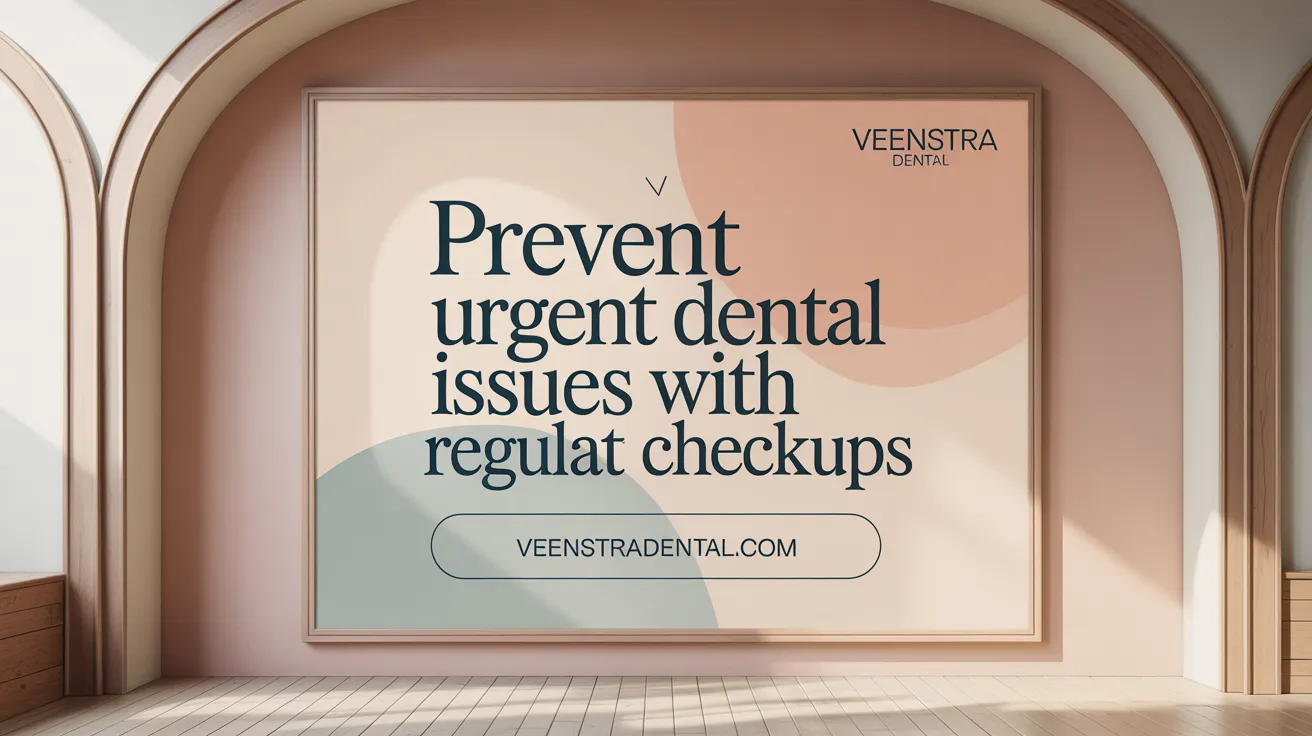
How can routine dental checkups help avoid dental emergencies?
Regular dental visits are essential for preventing urgent dental problems. During these checkups, dentists can identify early signs of cavities, gum disease, or cracked teeth before they cause pain or lead to complicated procedures.
One of the main benefits of routine exams is that they include professional cleaning, X-rays, and screenings for oral cancer. These tools help reveal hidden issues that cannot be seen or felt during daily brushing and flossing.
By catching problems early, dentists can provide prompt treatments that stop issues from worsening. For example, a small cavity can be filled easily, preventing it from turning into a painful root canal or loss of the tooth.
Dentists also give patients education on good oral hygiene practices. They might suggest specific brushing and flossing techniques or preventive treatments like fluoride applications or sealants to strengthen teeth and reduce future risks.
Maintaining consistent, routine visits is a proactive way to protect your mouth, avoid emergencies, and ensure overall oral health. It not only saves you pain and discomfort but also reduces time and money spent on more serious, urgent dental care later.
Prioritize Regular Dental Checkups for Lifelong Health
Routine dental checkups are indispensable for maintaining optimal oral health and preventing complex dental problems. By scheduling regular visits, individuals benefit from early detection, professional care, and personalized guidance that collectively safeguard teeth and gums. These proactive steps not only help avoid costly treatments and emergencies but also contribute significantly to one’s overall health and quality of life. Embracing the habit of regular dental exams is a vital investment in your smile and well-being that pays dividends for a lifetime.
References
- Oral Hygiene: Best Practices & Instructions for Good Routine
- The Importance of Routine Dental Checkups
- How Often Should You Get Routine Checkups At The ...
- Why Regular Dental Exams & Cleanings Are Essential for ...
- Importance of Regular Dental Checkups
- The Crucial Role of Regular Oral Exams in Preventing ...
- Why Routine Dental Exams Are Essential for Long-Term ...
- Essential Reasons for Regular Dental Check-Ups
